Sidetrain is an online learning platform and tutoring marketplace that connects students with experts in many fields. It offers 1-on-1 coaching sessions in areas ranging from academics to hobbies. In this article we explore Sidetrain’s features, pricing, and how it stacks up to alternatives. The goal is to give students and parents clear information when comparing Sidetrain with other tutoring services.

Sidetrain Reviews and Testimonials
Trustpilot – Sidetrain has 4 reviews on Trustpilot with an average rating of 3.9/5. Customers on Trustpilot praise its affordability and platform. For example, one user wrote that Sidetrain’s “affordable pricing options … make professional coaching accessible to everyone”. Another highlighted the “intuitive and sleek” user interface. Reviewers also liked how easy scheduling and the variety of topics are: a student said the scheduling is “seamless” and the mentor variety is “impressive”. Many noted high tutor quality – e.g. Sidetrain “has been a game-changer” and the coaches’ quality is “outstanding”. There were no negative comments in these reviews, suggesting generally positive feedback.

Product Hunt – Sidetrain’s Product Hunt page shows 2 reviews, both giving 5/5. One reviewer (an independent user) praised Sidetrain for its personalized one-on-one mentorship in music and business, noting it “stands out because it offers one-on-one sessions, not generic advice”. Another reviewer (a Sidetrain developer) highlighted the intuitive interface and supportive learning community. These users particularly liked connecting with industry experts (e.g. for music production or SEO). Again, feedback was completely positive with no complaints noted.
Official Website (Sidetrain.com) – Sidetrain’s own site does not feature user testimonials. The company describes itself as “a marketplace that connects talented professionals, mentors, tutors and teachers with students” in one-on-one sessions. It emphasizes personalized learning but does not publish independent reviews.
Is Sidetrain legit? – Based on the above reviews, Sidetrain appears to be legitimate. Users on Trustpilot and Product Hunt report successful experiences (with overall positive feedback). We saw no evidence of fraud or scam; reviewers specifically praised Sidetrain’s service quality. In summary, Sidetrain’s customer feedback is generally positive, suggesting it delivers on its promises. Overall, students value its affordable rates and quality of mentors, and we did not find any serious issues raised in reviews.
Summary: Sidetrain’s online feedback shows users like its low prices, variety of subjects, and ease of use. No major negatives were reported in reviews. The platform seems to be a genuine service with satisfied customers. Its small number of reviews (4 on Trustpilot) means feedback is limited, but what we found was consistently good.
Sidetrain Pricing
Pricing Range
Tutors on Sidetrain set their own session rates (typically in USD). The company charges a 20% commission on each session fee. For example, if a tutor charges $50/hour, Sidetrain would keep $10 and the tutor gets $40. Sidetrain does not publish fixed prices; session costs depend on tutor expertise and time. We did find that sessions can be as short as 15 minutes, implying some very low-cost options. In practice, short 15- or 30-minute calls can cost just a few dollars, while longer, specialized lessons likely cost tens of dollars per hour. Overall, prices seem very competitive compared to typical tutoring rates in the US (often $25–$80/hour). (See Sidetrain’s Terms for details on fees and commissions.)
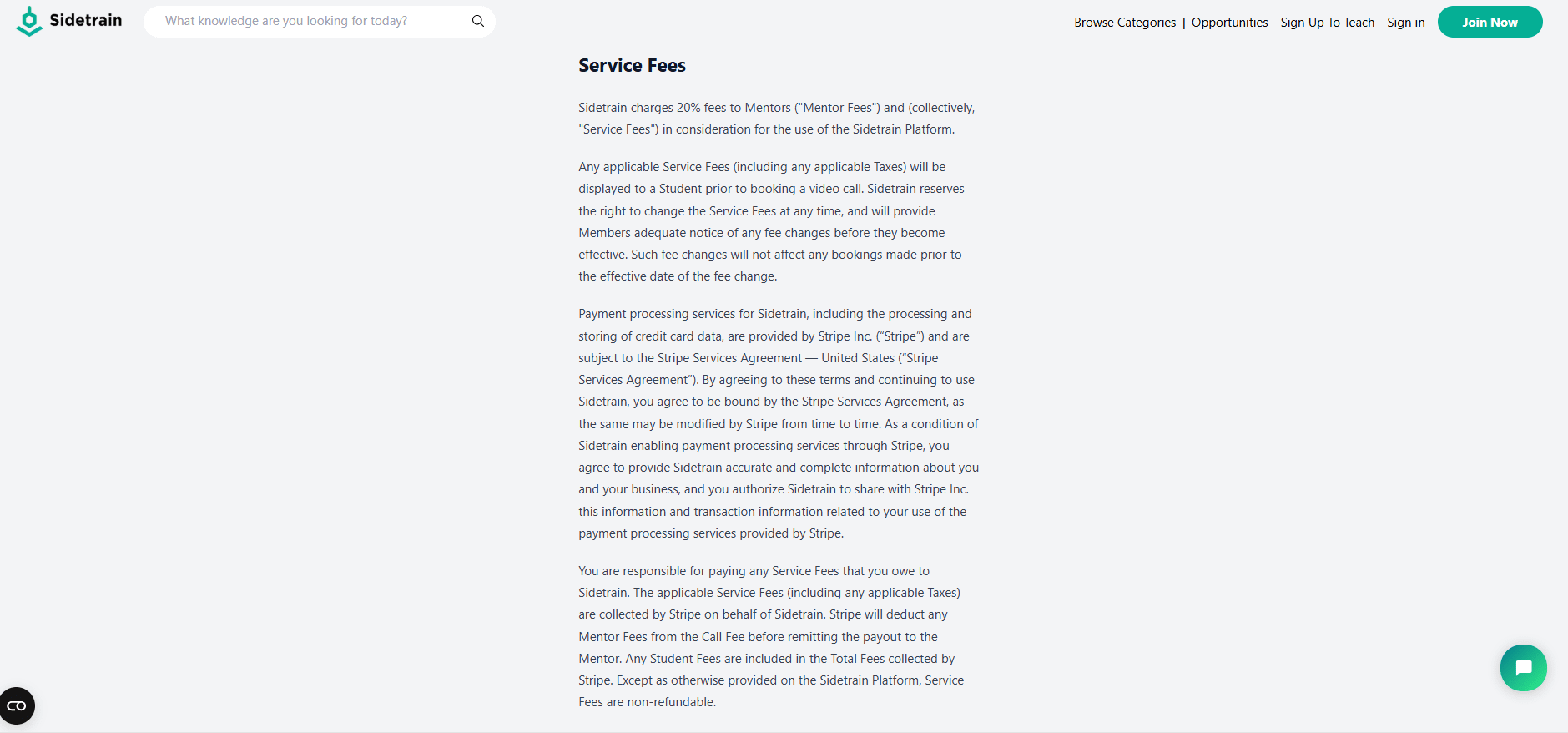
What students say about Sidetrain Pricing
Users generally find Sidetrain’s pricing reasonable. A Trustpilot reviewer explicitly called the pricing “affordable” and noted it made coaching “accessible to everyone”. No reviewers complained about high costs. By comparison, industry data show average tutoring rates around $25–$80 per hour in the US. Sidetrain’s option to book very short sessions means it often undercuts these averages – making it appear value-priced. In short, students feel Sidetrain offers good value for money, especially given the quality of tutors reported.
Hidden costs
We found no mention of extra hidden fees. Sidetrain does not charge a signup or registration fee. The only fee disclosed is the 20% commission on sessions. Payments are handled by Stripe, which may charge credit-card processing fees (though Sidetrain does not add its own extras). Cancelling a session may forfeit the fee: Sidetrain’s policy states that service fees are non-refundable. In practice, this means if a student cancels a booked session, they might not get their money back. Beyond that, we saw no evidence of surprise costs or mandatory subscriptions.
How Sidetrain’s pricing works
Students pay for each session upfront via Stripe (credit card or PayPal). When booking, the platform shows the total cost including any service fee. Sidetrain does not advertise monthly subscriptions or package discounts – it operates on a pay-as-you-go basis. There are no special discount programs mentioned (no apparent student or military discounts published). In summary, users pay for sessions at the agreed hourly rate, a 20% platform fee is included, and payment is collected by Stripe.
Free Trial
Sidetrain does not advertise a formal “free trial” in its help pages. However, the website does allow booking a complimentary first session with some mentors: for example, on the founder’s profile there is a “BOOK A SESSION” button. This suggests that new users may get one free introductory call. The exact terms of any free session (like duration or limitations) are not clearly stated on the site.
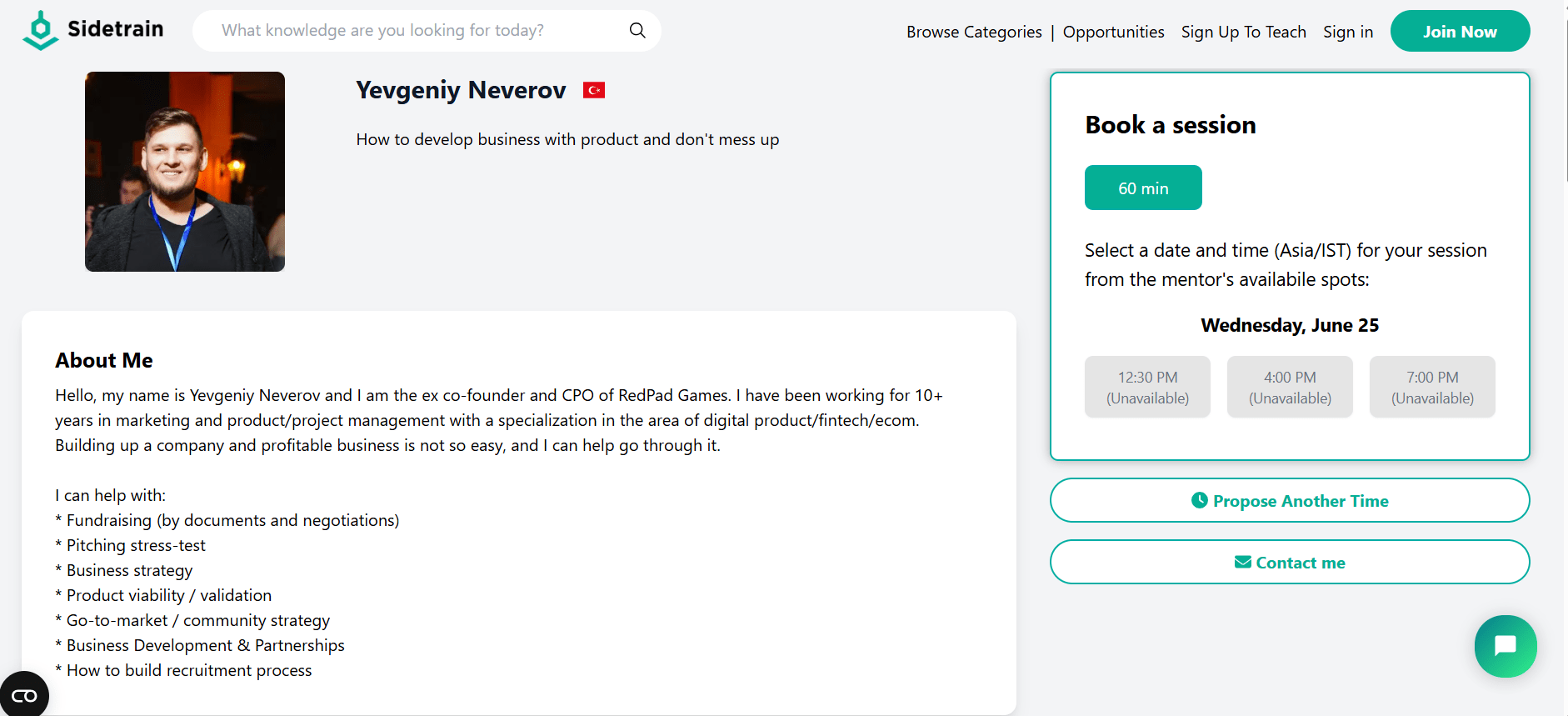
Refund policy
Sidetrain’s official policy is that service fees are non-refundable. In other words, once a session is booked and paid, you generally do not get your money back. We found no user reports on forums claiming easy refunds or chargebacks. In reviews, no one mentioned getting a refund or complaining about unfair charges. Overall, it appears Sidetrain does not honor refunds except as stated by law. Students should be careful: if a tutor is unavailable or sessions are unsatisfactory, the fee may still not be returned. (This contrasts with some competitors that offer satisfaction guarantees.)
Sidetrain Alternatives
Some students prefer to compare multiple tutoring platforms before choosing. Popular Sidetrain alternatives include Chegg, Wyzant, Varsity Tutors and My Engineering Buddy (MEB). Each has different strengths:
Chegg
Chegg Tutors offers on-demand help and also academic resources (textbook solutions, Q&A). It requires a monthly study subscription (~$15.95) and charges about $28/hour for live tutoring. Pros: Large, well-known platform with many subjects; 24/7 availability; extra resources like solution libraries. Cons: Can be pricey (expensive per-minute rate), especially for quick questions. Reviews often complain about high cost and impersonal service. Compared to Sidetrain, Chegg has more comprehensive homework help, but Sidetrain’s one-on-one coaching may feel more personalized (without a bulky subscription).

Wyzant
Wyzant is a US-based tutoring marketplace where tutors set their own rates. Hourly fees vary wildly (from as low as $10 to over $600/hour according to one source). Pros: Huge tutor network (over 65,000) covering many grades and subjects; strong search and matching tools; first hour free guarantee for new tutors; transparent tutor profiles. Cons: High-priced experts (especially Ivy-League tutors at $100+/h); steep tutor commission (40%). Some students find good, budget tutors but top experts are expensive. Compared to Sidetrain, Wyzant is more established and academic-focused, but often more expensive overall.

Varsity Tutors
Varsity Tutors is a professional tutoring service (often used for test prep and advanced subjects). Pricing is generally high – parents report paying around $100/hour, and packages often cost $300 or more per month. Pros: Vetted tutors (often near Harvard/Stanford grads), good for AP or college-level courses, multiple formats (group classes, in-person options, test prep). Cons: Very expensive; requires multi-week commitments; mixed reviews on tutor consistency. In comparison, Sidetrain is much cheaper and more flexible, though Varsity Tutors might offer more structure and guaranteed qualifications for some programs.
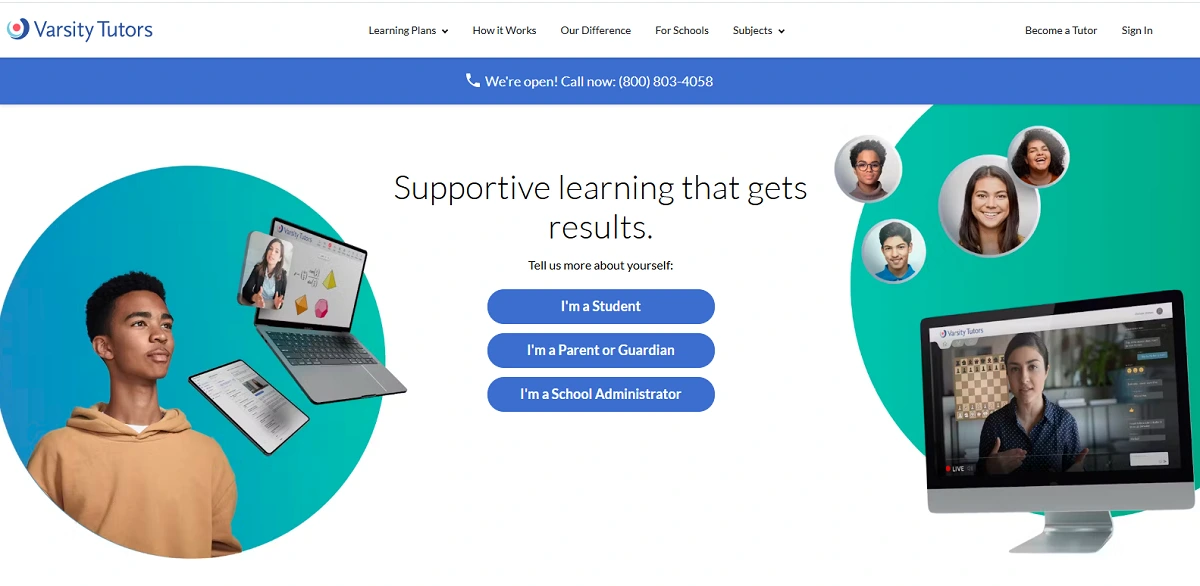
My Engineering Buddy
My Engineering Buddy (MEB) is an online tutoring platform that focuses on engineering and advanced STEM subjects. Pros over Sidetrain: 24/7 academic support specifically for college-level math, physics, coding, etc.; pricing starts around $20/hour which is lower than many competitors; a satisfaction/money-back guarantee is offered (the founder explicitly “takes responsibility for your results”); and tutors are heavily vetted (promoted as “brightest tutors from top universities”). MEB highlights a 97% student satisfaction rate and serves thousands of students with personal attention. Cons: It does not cover non-STEM subjects (no sports or language coaches). In short, MEB excels when you need deep help in complex subjects, whereas Sidetrain is more of a generalist marketplace. (For complex homework help, MEB is often recommended over broader platforms.)
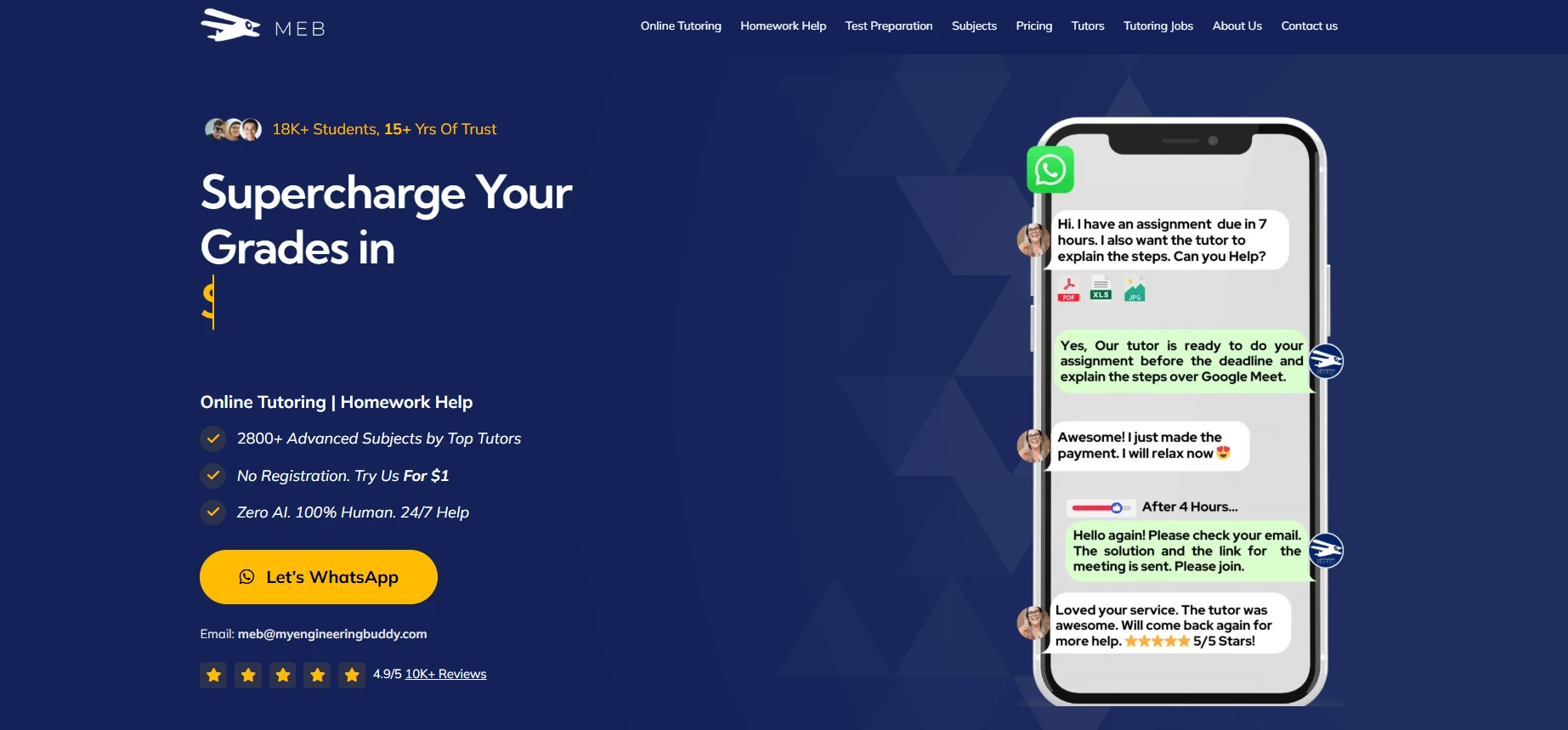
How it Works?
For Students
Students first create a Sidetrain account and fill in their learning needs. They can browse mentor profiles or post a specific request. Scheduling is flexible – you pick a time that fits your schedule and pay when booking. Sessions are one-on-one video calls (no extra software needed. Students can rate mentors after the session, which helps find good tutors. In summary: sign up online, choose a mentor or topic, book a session, and connect via video at the scheduled time.
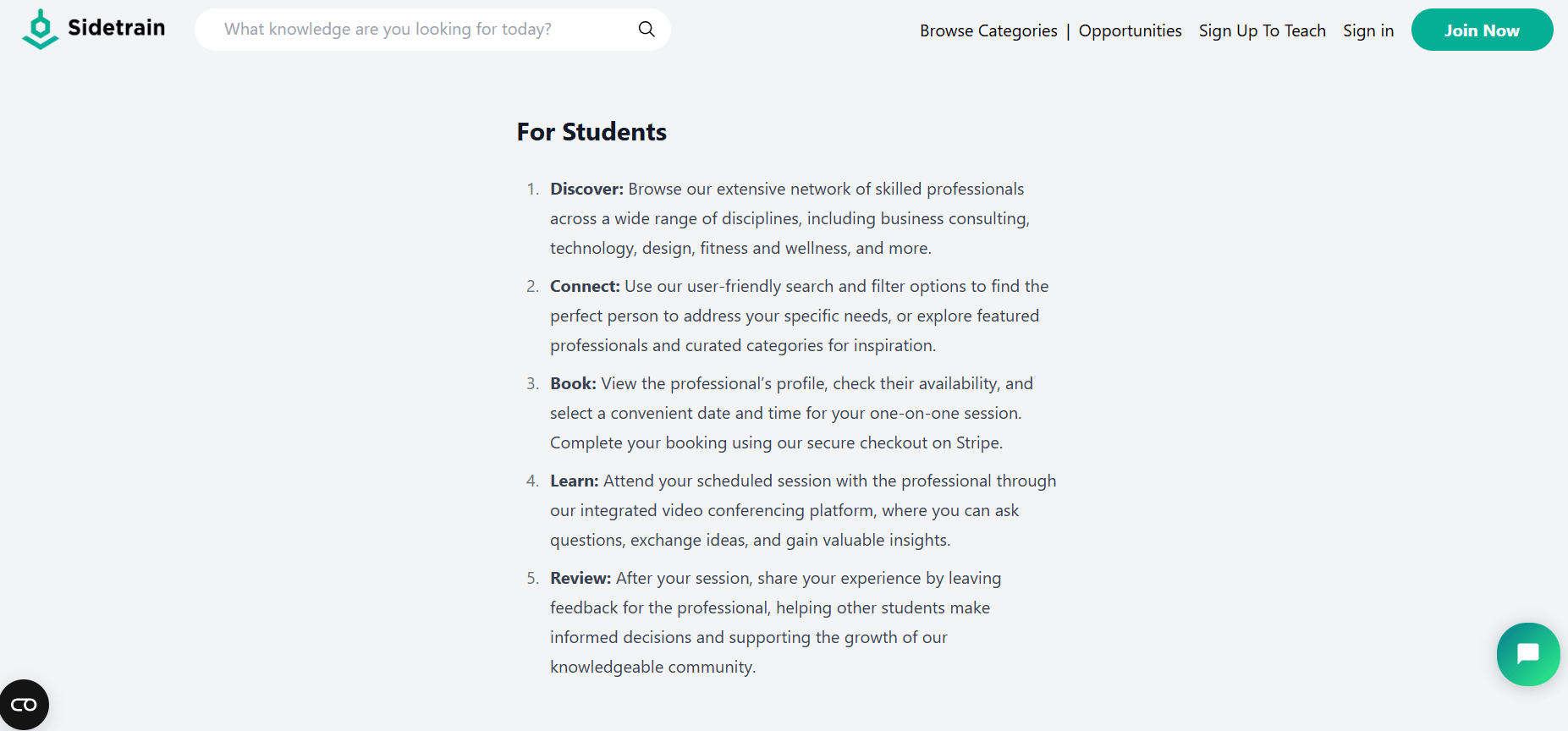
For Tutors
To become a tutor on Sidetrain, one goes to the “Teach on Sidetrain” sign-up page. You create a mentor profile, list your skills and set your hourly rate for 15-, 30- or 60-minute sessions. You also set your own availability; there is no minimum commitment or fixed schedule. Sidetrain will review your profile (though note it doesn’t automatically verify your credentials) and then list you on the platform. When a student books you, Sidetrain handles scheduling and payment via Stripe. Tutors receive 80% of the session fee (Sidetrain takes 20% commission). Earnings depend on your rate and how often students book you. There are no subscription or setup fees for tutors. In practice, new tutors should build up reviews and respond quickly to inquiries to get students. For full details, prospective tutors can visit Sidetrain’s “Sign Up To Teach” page to start the registration process.
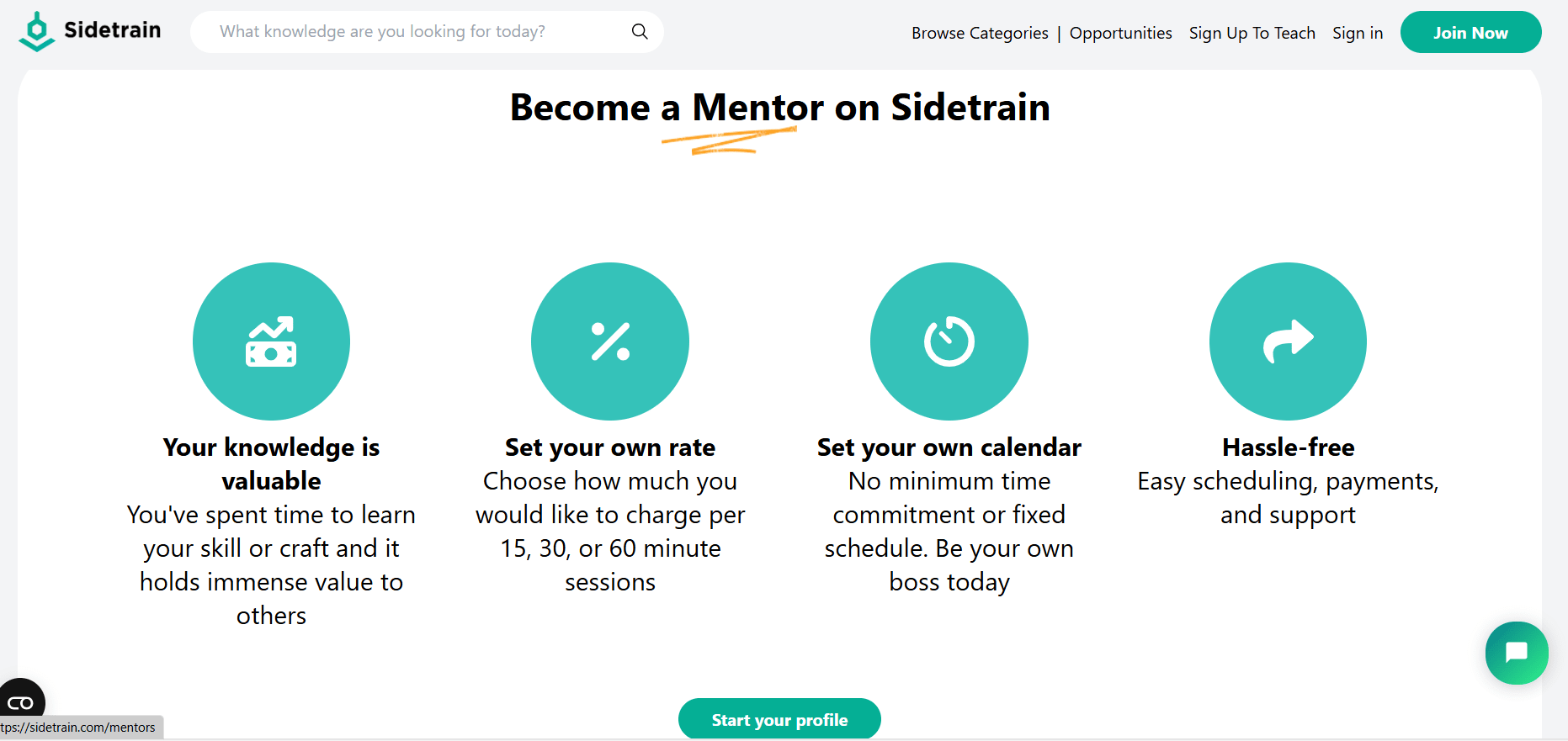
FAQs
Can tutors set up their own fee or is it fixed by the company? Tutors on Sidetrain set their own rates. The platform allows mentors to choose how much to charge per 15, 30, or 60 minute session. Sidetrain only takes a fixed 20% commission; it does not impose rates.
How much can a tutor expect to earn per hour? Earnings vary. Since Sidetrain charges 20% commission, a tutor keeps 80% of whatever they charge. For example, a $50/hr rate yields $40 for the tutor. Top tutors on general platforms often earn $50–$100+/hr, but on Sidetrain rates may be lower. Exact income depends on your rate and how many hours you book.
How many hours of work can a tutor get per month? This depends entirely on demand. Sidetrain does not guarantee any minimum bookings. Some tutors may get many students and work 10–20 hours per month, while others just a few. Busy or highly-reviewed tutors tend to get more sessions; new tutors may start slowly.
Is it easy to get students? Getting students can be competitive. Sidetrain is a smaller platform, so exposure is lower than on sites like Chegg. Tutors build credibility through good reviews and quick responses. New tutors often attract students by offering low introductory rates or free trial sessions. Consistently good sessions and marketing (responding promptly, having a detailed profile) can lead to more bookings over time.
What are some tips on how to get more students on Sidetrain? Key tips include: fill out a complete profile, highlight your qualifications, and offer a competitive rate. Mention any specialties or certifications. Being responsive to messages and flexible in scheduling helps. Encouraging satisfied students to leave positive reviews will improve your ranking. Some tutors start by offering one short introductory session (like 15 min) at a low cost to win ratings.
What do tutors like about Sidetrain? Tutors appreciate the flexible, student-driven model. Sidetrain lets them set their own hours and rates, so they can work when they want. The platform handles scheduling and payment, reducing admin work. Tutors also like that Sidetrain markets the service (so they don’t have to find students themselves). The general ease of use (intuitive dashboard) has been noted positively.
What do tutors not like about Sidetrain? A few drawbacks: Sidetrain takes a 20% cut of earnings, which some tutors find steep (though this is in line with other sites). Some tutors mention that because Sidetrain is relatively new, the volume of students can be low, so it may take time to get regular bookings. Also, there is no automatic credential verification, so tutors must trust students to check their qualifications. Finally, without a formal satisfaction guarantee, some tutors and students may feel less protected in disputes.
How does Sidetrain compare to My Engineering Buddy? Sidetrain is a broad “learn anything” platform, while My Engineering Buddy (MEB) is laser-focused on engineering and STEM. MEB highlights advanced math, physics, coding, etc., and explicitly vets tutors from top engineering schools. MEB has lower pricing (starts at about $20/hr) and even offers a money-back guarantee on lessons. Sidetrain covers more diverse topics (even non-academic ones) and uses a marketplace model. For students needing deep help in complex engineering subjects, MEB’s specialized tutors and guarantee make it often a better choice than Sidetrain.
What subjects does Sidetrain cover? Sidetrain covers a very wide range. Its categories include sports coaching (e.g. soccer, basketball training), personal fitness, business and entrepreneurship lessons, and language tutoring (English, Spanish, Japanese, etc.). In short, anything from academic courses to life skills and hobbies can be taught by Sidetrain mentors.
Does Sidetrain support international customers? Yes, Sidetrain serves students worldwide. The FAQ section includes “Do you support international customers?”, implying they do. Sessions are booked in your local time zone, and Sidetrain accepts users from any country (the platform is English-based). One Trustpilot contact lists the company location as “United States”, but as an online service it caters globally.
Can I schedule a session anytime? Sessions are scheduled based on the tutor’s availability. Sidetrain’s system shows available slots in the student’s time zone. You pick an open time, pay in advance, and then join a video call at that time. The video link is provided by Sidetrain. The FAQ implies you can book multiple sessions with the same mentor if needed.
Is my payment information secure? Yes. Sidetrain processes all payments through Stripe (a well-known payment processor). Stripe ensures credit card data is encrypted and handles the transaction. Sidetrain itself never sees your card details.
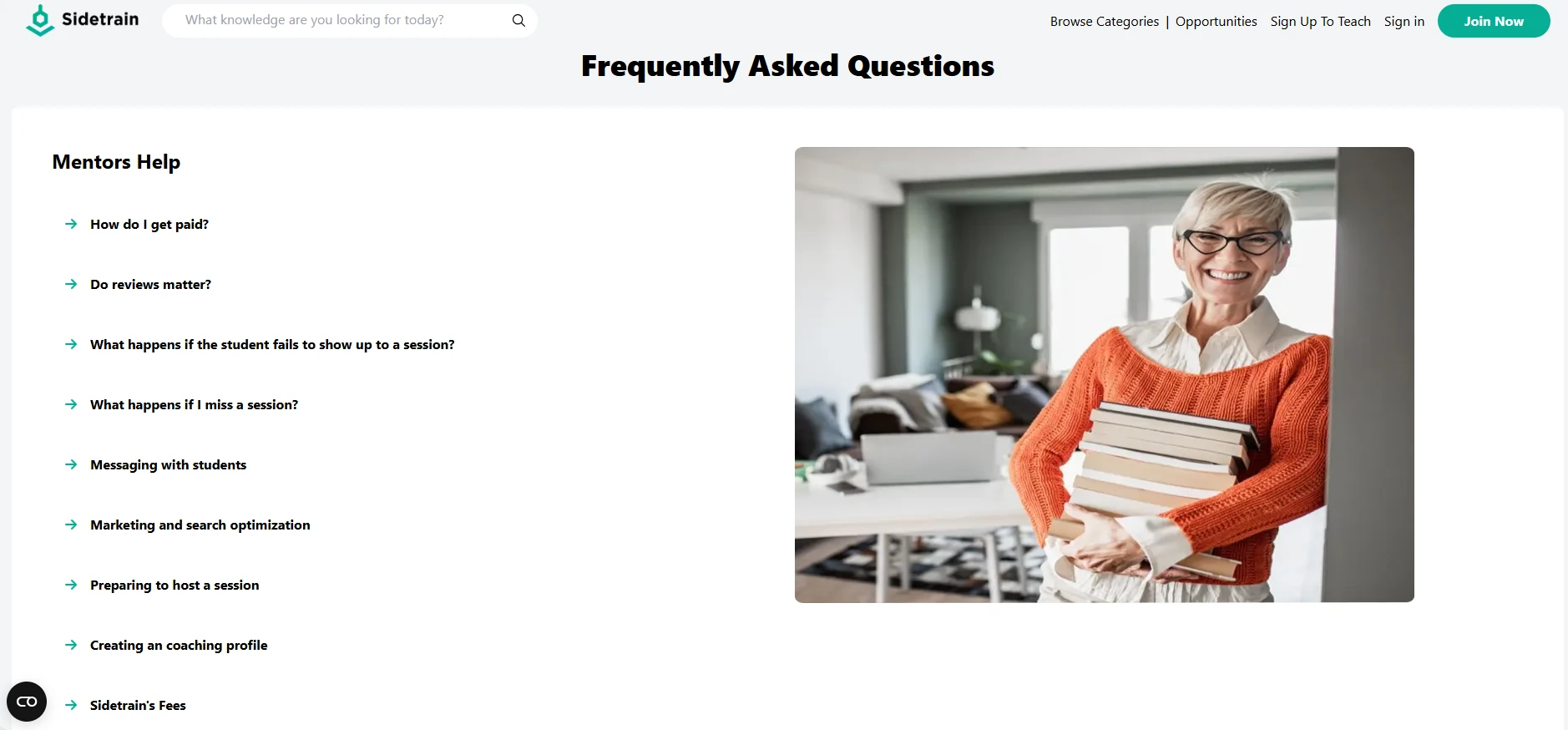
Customer Support and Policies
Sidetrain’s public policies suggest support is mainly via email. Their Terms list “hello@sidetrain.com” for contact, but we found no live chat or phone support info. Response times are not publicly documented. By comparison, My Engineering Buddy advertises 24/7 chat support via WhatsApp. In terms of refunds and guarantees, Sidetrain follows its non-refundable policy, whereas MEB promises a refund if you’re not satisfied. So MEB offers more explicit guarantees and immediate support options.
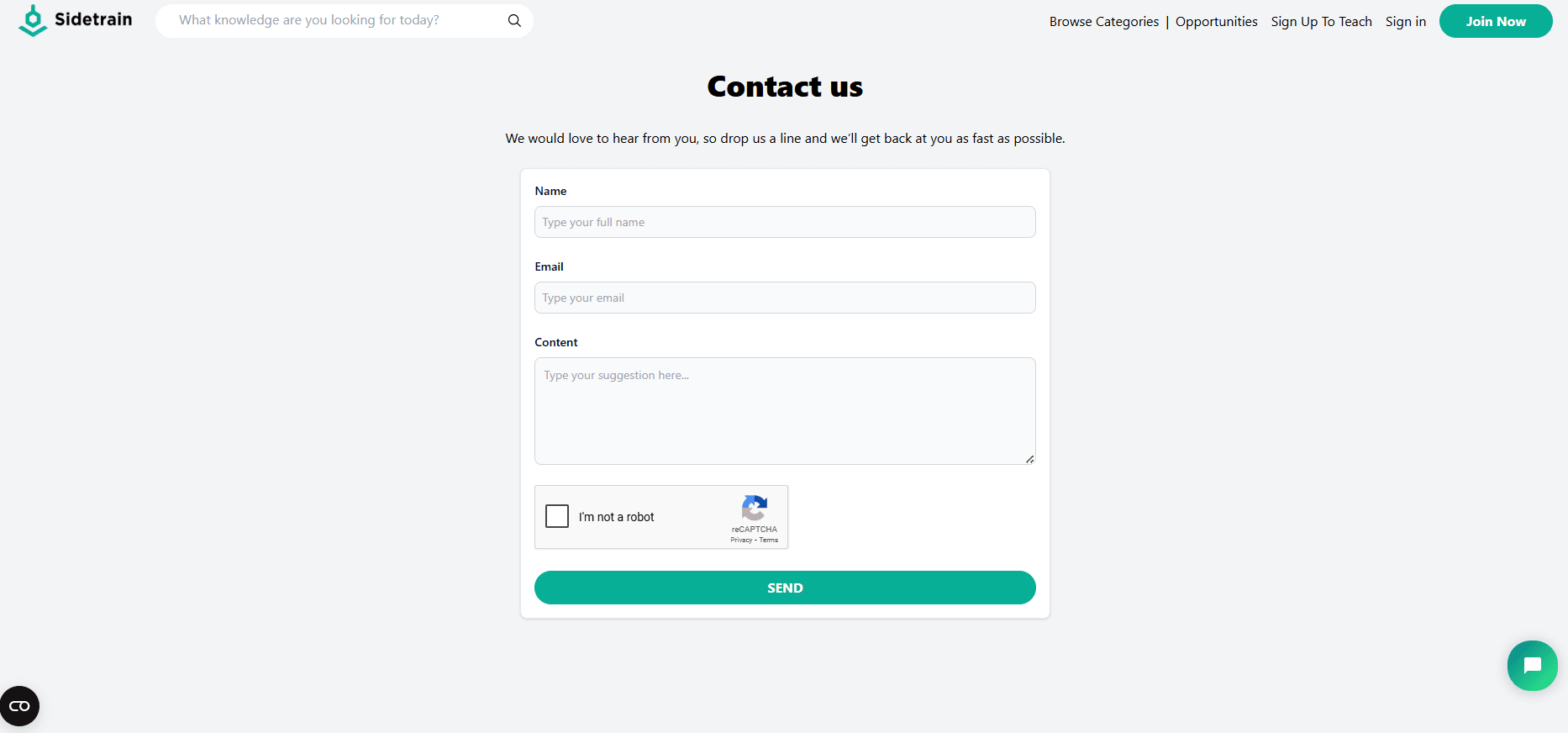
Global Reach and Localization
Sidetrain appears designed for a global audience, but it is primarily English-language. The platform offers language tutors (e.g. Spanish, Japanese), indicating some multilingual offerings. However, the website and customer service are in English. There’s no indication of separate localized sites. My Engineering Buddy is also global but similarly English-focused, with no special interface languages. Both platforms rely on Internet access, so they work in most countries with English fluency.
Sidetrain’s future plans
We found no official roadmap or press releases about Sidetrain’s upcoming features. The site and blog do not mention artificial intelligence or new technology integrations, so as of now Sidetrain relies entirely on human tutors. It’s possible they may add more mentor categories or improve the booking platform, but no specific plans are published. (By contrast, some competitors have started using AI tutors; Sidetrain has not announced any AI offerings.) Their blog does cover new guide articles, but we saw nothing about future expansion beyond growing its mentor base. In summary, Sidetrain’s public information does not reveal clear future directions.
Conclusion
Sidetrain’s strengths are its personalized 1-on-1 sessions, wide range of subjects, and affordable pricing (as noted by users). It lacks some guarantees and is relatively new, meaning fewer reviews to judge by. Its main weaknesses are no refund policy and a small review base, but it delivers on promised mentor quality so far. Overall, Sidetrain is a viable tutoring platform, but for advanced STEM tutoring My Engineering Buddy often provides a stronger value (specialized tutors, guaranteed results, and 97% student satisfaction). For complex college-level subjects, MEB’s focused service is a great alternative to consider.
******************************
This article provides general educational guidance only. It is NOT official exam policy, professional academic advice, or guaranteed results. Always verify information with your school, official exam boards (College Board, Cambridge, IB), or qualified professionals before making decisions. Read Full Policies & Disclaimer , Contact Us To Report An Error

